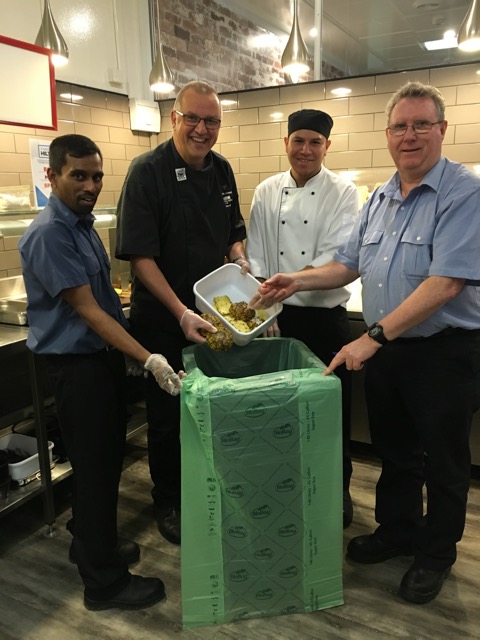Perth hotel uses BioBags to divert food waste from landfill to compost

Parmelia Hilton Perth kitchen and engineering team members
Parmelia Hilton Perth is reducing its carbon footprint by using compostable bin liners to recycle food waste. Using BioBags to recycle kitchen scraps diverts food waste from landfill to compost so it can be returned to the earth as nutrient-rich fertiliser.
Australia’s commercial and industrial sector, which includes hotels, restaurants, offices, retail and manufacturing, are our country’s biggest source of waste and landfill. About 2.2 million tonnes of food is thrown out by the commercial and industrial sector every year.1 When food waste is sent to landfill it contributes to greenhouse gas emissions. The greenhouse gases produced by food waste in Australian landfill each year are equivalent to the emissions of Australia’s steel and iron ore industries combined.2
Parmelia Hilton Perth caters for events with up to 500 people, has 284 guest rooms and the popular Adelphi Grill. Like any hotel, they have food waste but unlike any hotel, they put it into compostable bags and send it to a commercial compost facility. The hotel significantly reduces its carbon footprint by diverting plastic and food waste from landfill and recycling food waste so it can become soil fertiliser.
Western Australia, South Australia and Queensland have piloted programs to turn food waste from commercial kitchens into compost or fertiliser. The benefits to businesses include reduced waste to landfill fees.
“Compostable is the best end of life option for a bag because the bag and its contents can be diverted from landfill to organics recycling and compost,” says Scott Morton from BioBag World Australia.
“BioBags help divert food waste from landfill with less mess and odours. If it doesn’t make it into an organics recycling or compost bin, a BioBag will still break down into organic matter wherever there’s microorganisms and oxygen. A BioBag is a much better alternative to plastic because it leaves no toxic residues and plastic bags cannot go into organics recycling or compost bins.
“BioBags comply with the Australian Standard AS4736 so consumers can be sure they will biodegrade in any environment where microorganisms are active,” said Scott.
BioBag website: https://biobagworld.com.au/
1SARDI (2015) Primary Production Food Losses: Turning losses into profit. South Australian Research and Development Institute, Primary Industries and Regions South Australia
2Source: https://watchmywaste.com.au/food-waste-greenhouse-gas-calculator/ RMIT University, Melbourne
17th July 2018







